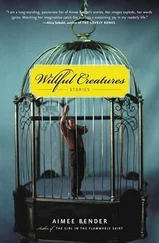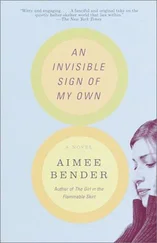I said his name at the door, and when no one answered, I pushed it open.
Inside his room, the light was off. I flicked it on. Joseph was sitting in the middle of the room, at a card-table desk, in a chair, at his laptop computer. Dressed. Awake. He looked sickly, and thin, but he always looked a little sickly and thin to me.
Hey, I said, startled. What’s going on? You’re here? Are you okay?
I’m fine, he said, quietly.
The bedroom in his apartment was small: wall-to-wall beige carpet, mirrored sliding closets, and no bed anymore, just one plain dresser, a couple of folding chairs, the desk, and a nightstand. One window, closed. In a corner, the carpet matted down in a long rectangle.
That’s your bed out there?
The floor is better for my back, he said.
You’re sleeping on the floor? What are you talking about?
He stared at me, his eyes flick-framed by those dark romantic lashes, the gaze too wide and unblinking.
What are you doing? I said.
Work, he said.
It was confusing, how he’d been so easy to find. In his jeans and T-shirt and shoes. No big deal. Plus, everything looked regular. On top of the dresser drawer leaned an old plaque from a string-galaxy drawing competition he’d won in junior high school, and another one of Mom’s oak jewelry boxes that she’d made in her more advanced years of woodworking. A few sprinkled pennies and nickels, a loose dollar bill, worn to cloth.
He looked at me expectantly, but there was another card-table chair open in the middle of the room, also with Morehead written liltingly on the back, and something about the ease of everything was bugging me, something about actually finding him sitting there seemed worse than my usual time spent with nothingness, so I walked over to the free chair and sat down.
Why couldn’t you just let me in? I broke your chain lock.
I was busy, he said. Am .
I scanned the room. In his closet, two worn plaid shirts hung above several pairs of hiking boots. A few rubber bands and pencils and a pen rolled on his nightstand, a brown-stained spruce model that stood boxily beside the absence of a bed. I got up again and clicked off the glare of the overhead light. Outside the window the sun had gone down, and the long end of day spread itself in swaths over the apartment buildings, where cars continued driving into their slots.
Doing what?
Work, he said again.
No, I said.
I’m busy , Rose, he said, clipped. Can you go?
I slid open the window, and watched a red Honda Civic back into a spot. A woman got out, shaking her hair. She didn’t pay attention when she opened her car door, and another car nearly lopped off her leg.
I’ll explain later, he said. It’s a complicated experiment.
I bet, I said. Why aren’t you answering the phone? I drove all the way over. How come you’re so easy to find?
– .
Are you eating?
– .
Drinking any water?
I need to concentrate, he said, his voice dwindling away.
I kept my post at the window, watching the cars.
Outside, the white air deepened into blue. The dimming famous romantic southern-California dusk. I had done my job, so I expected myself to leave. I could call Mom to confirm his aliveness, bring him a ham sandwich and a glass of water, and drive back, continuing the debate in my head about whether or not to go to Eliza’s party.
Except it was so familiar, the feeling in the room. The air held a tinge of the same heaviness I’d seen on Joseph’s face many times during those babysitting moments, when he’d reappeared, exhausted-looking, tufty-haired, and, standing there at the window, I felt a little like a detective must feel when about to turn a corner on a case. As if, if I stood still enough, very very still, as still as I possibly could, then I might see something I had not seen before.
It shifted my bad mood a little, to note this. The irritation was becoming just a staticky front underneath of which was forming an arrow of anticipation, beginning to point. I kept my post at the window until the apartment buildings across the street were obscured by darkness. The modest joy of seeing windows click on, the simple pleasure of rectangles of yellow light exposing the dark twists of tree boughs.
A few more cars crept up the street, headlights on. I returned to the chair in the middle of the room, and sat down.
At his desk, Joseph visibly stiffened.
I’ll e-mail Mom, he said, how’s that? Right now.
I shook my head.
Sorry, I said. I guess I just feel like staying for a little while more.
How long is a little while? he said, almost shrill.
I don’t know.
He didn’t turn. We sat in a row, him in front of me, facing the wall, like passengers on a stationary train. His laptop was on screen saver, swirling fish in a bubbling tank, so I couldn’t see if he was really working on anything or not. On the rest of the desk/table, nothing. A couple pencils. Faint markings, in pencil, sketched out on the wall under the window. Just scribbles here and there about whatever, half an equation, or some numbers in a row.
His fingers dug into the table’s rim.
Sorry, I said again.
What was also strange to me was how he didn’t get back to work. Hadn’t while I’d stood at the window. Still didn’t now. In earlier days, when I just wanted to be in the same room as him, he would try his best to ignore me and then would bring the pad of paper or book in a huff into the next room, maybe swearing at me, or locking the door. But here he stayed put. On an impulse, I reached over and slapped down on a key, to wake the computer up, and he started-what!-and the screen cleared and it was just a news page, just the front page of the New York Times , talking about the economy and foreign policy. No open files, as far as I could tell.
That’s your work? I said. You’re reading the news?
And?
Darkness soaked into the room.
There was nothing upsetting, that I could see. It wasn’t like there was anything about sex in the air-no hastily covered blanket, or lurking shame or edge of pleasure. And it wasn’t emotional-it wasn’t like I’d just stumbled in on Joseph rocking himself in a corner in tears or stabbing himself or like I’d found his diary in a drawer and read it aloud over the high-school intercom. No bomb ingredients or drug baggies, no samurai sword or gun or syringe. Whatever was happening was different than all of that, was more private, more closed off: all that came through was that he just wanted to be as alone as possible, aloner than alone, alonest, and my presence in the room was as invasive as if I’d strapped electrodes to his skull and was reading the pulses of his mind.
I’d just like to stay for a little while longer, I said, as quietly as I could.
You’re such a fucking pain! he said. You’ve always been the worst pain in my fucking ass! and he slammed the laptop lid down, but he did not get out of that chair.
In any other instance, in those countless other examples, he would’ve stalked out, would’ve gone to the corner farthest from me, maybe off in the kitchen, or on the balcony, but he did not, which was notable, so I started to pay attention to the chair. Just to look closer at it. It was the same chair as mine, the third in that series of four card-table Morehead chairs, sent by Grandma, his personal choice of furnishings for the apartment.
He was sitting in the chair, the way a normal person sits in a chair, but when I looked very closely, it seemed like the chair leg vanished right into his shoe. That the chair legs went inside both legs of his pants, and when I looked even closer, I could see that he had actually cut holes of the correct size in his pants to place the chair legs through the pant legs, and then, ostensibly, the leg of the chair, a light rat-colored aluminum metal with a rubber bulb at the foot, went down to share space with his own foot, inside his shoe.
Читать дальше












